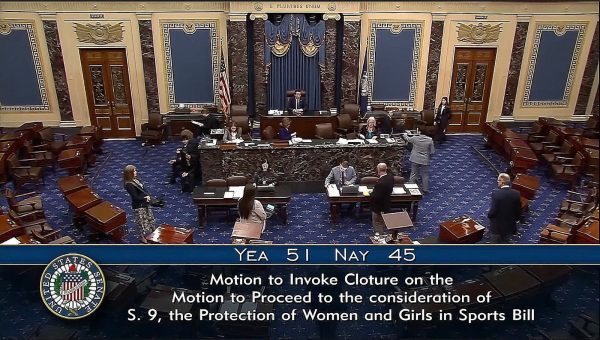
On March 3, Democrats in the Senate successfully blocked a Republican-led bill to ban transgender athletes from women’s and girl’s sports. This bill, named the Protection of Women and Girls in Sports Act, would prohibit federally funded schools from allowing transgender athletes who were assigned male at birth to compete in girls school sports. If schools did not comply with the bill, they would lose their federal funding. Voting was along party lines with only four senators abstaining: Shelley Moore Capito, R-W.Va.; Cynthia Lummis, R-Wyo.; Elissa Slotkin, D-Mich.; and Peter Welch, D-Vt. However, with a slim majority in the Senate, Republicans needed Democratic support to pass the bill. Many Democrats argued for keeping the federal government out of the issue, leaving it up to states and local communities. The bill needed 60 votes to pass but ended with a 51-45 in a filibuster.
The bill was introduced to the public in January by Republican Senator Tommy Tuberville. Senator Tuberville argued that “since the beginning of time, people have agreed that sex is assigned at birth and determined by God.” He stressed the necessity for Republicans to unite and pass the bill to establish clear guidelines, safety, and fairness. The Protection of Women and Girls in Sports Act of 2025 would ensure Title IX requirements treat gender as “recognized based solely on a person’s reproductive biology and genetics at birth,” said Republican Senator Katie Britt, a supporter and voter of the bill.
While some argue for fairness and safety, Topher Olson, a student-teacher at Franklin and transgender ultimate frisbee player at the college and club level, feels “upset, … confused, and also not surprised.” Although the bill wouldn’t directly affect Topher as USA Ultimate removed all hormone requirements for participation in the women’s division in 2019, her experiences as a transgender athlete still highlight the broader effects of transgender athletes. “Being transgender affects my involvement constantly, but so does being cisgender affect cisgender athletes! We are all gendered beings. We are all limited by the imperfect systems based on biological sex.” Topher acknowledges the issue is complex as “all [solutions] come with opportunities, risks, [and] sometimes contradictory issues.” However, she also believes in its simplicity, saying, “People deserve to belong somewhere. People deserve to be loved.”
The bill comes after the Trump administration’s Department of Education’s Office for Civil Rights opened up an investigation into Oregon School Activities Association (OSAA) and Portland Public Schools (PPS) for allowing a high school transgender athlete to compete in the girls track and field division over the last two seasons. PPS Superintendent Dr. Kimberlee Armstrong said the district is in full compliance with Oregon law and is cooperating with the investigation.
The bill was attempting to codify President Trump’s Feb. 5 executive order which directed the Department of Education to inform schools that allowing transgender athletes to compete in female sports violates Title IX. “My administration will not stand by and watch men beat and batter female athletes,” said Trump during his signing. Although President Trump signed the executive order, it does not have the longevity of a law passed by Congress because it can be canceled, revoked, adjudicated unlawful, or expire at any given time.
Before President Trump’s second term began, transgender rights had been a major focus of the Republican party. Trump ran numerous campaign videos which included criticisms of “woke gender ideology” and transgender people Yet, according to a Gallup survey in 2024, Americans rank other issues more important than transgender rights, including the economy, immigration, and health care.
Franklin’s Assistant Cross Country Coach Ashley Rose emphasizes the importance of protecting transgender athletes and prioritizing their mental health. “I think we have focused too much on winning and set our student-athletes up for failure by emphasizing that winning or placing is the only measure of success as an athlete. Focusing on the idea of everyone striving for their own personal best can be a good way to help others come to terms with transgender athletes competing.” Rose believes having open conversations with people who hold different views can foster common ground, saying, “My hope is always that I can help others see that there are different ways we can view success in sports.”


































